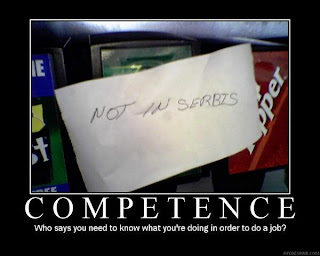Competence and Poker
 Have returned to the online tables this week, probably playing more hands in the last few days than I did for the previous eight weeks combined.
Have returned to the online tables this week, probably playing more hands in the last few days than I did for the previous eight weeks combined. This sort of routine has happened each summer I’ve been away at the World Series of Poker. During the Series I get the chance to play live here and there, but unsurprisingly will have little time or inclination to fire up the online games. Then once I return home, I find I am excited to play once again. And even a little bit inspired to learn and improve, too.
This week I’ve been flitting about between various games, including jumping into tourneys, too. While in Vegas I had the chance to play mixed games on a few occasions, and so I have been gravitating towards the 8-game mix on Stars. Have also put in hands of pot-limit Omaha, razz, and limit hold’em.
The 8-game mix in particular -- where one rotates between limit hold’em, Omaha/8, razz, stud, stud/8, no-limit hold’em, pot-limit Omaha, and 2-7 triple draw -- has gotten me thinking about this idea of “competence” in poker, perhaps because occasionally there one will not too infrequently run into players who appear to lack basic fundamental knowledge of a given game.
It’ll happen in other games, too, of course. Sit down at a low limit razz game and often somebody will be there wanting to play every hand with face cards showing. The presence of those without what seems basic “competence” does tend to highlight the whole idea of one’s own knowledge of rules and basic strategy of a given game. And maybe make one feel somehow special for knowing something someone else does not.
Before I got too carried away congratulating myself for my own competence -- e.g., knowing I wanted to see a deuce among my starting five cards before getting too involved in a 2-7 triple draw hand -- I started to think further about how “competence” is surely needed in poker, though probably shouldn’t be a goal in and of itself.
Back in the 1980s, a fellow named William Howell wrote a book called The Empathic Communicator in which he described the “four levels of competence” in a way that has been much-referred to ever since. In fact, Howell’s idea built on theories of learning established by others some time before, but his little scheme became kind of popular in the 1990s as a way of talking about teaching and how people learn.
Basically Howell just highlighted how people can have or lack competence and how people can possess differing levels of awareness of having or lacking competence. From there come the four levels of competence:
There’s “unconscious incompetence” in which a person doesn’t know how to do something, nor is that person even aware he or she lacks such knowledge. Kind of like those seemingly “Level Zero” thinkers one sometimes runs into at the poker tables (especially at the lower limits).
There’s “conscious incompetence” where one doesn’t know how to do something but realizes one lacks such knowledge. I know if there is something wrong with the motor of my car I cannot fix it myself, so I take it to the shop.
Then there’s “conscious competence” in which a person knows how to do something, but it requires special effort or concentration to show such knowledge. I sometimes think when I play certain games like 2-7 triple draw or razz or really anything besides hold’em, I am “consciously competent” at best.
Finally there’s “unconscious competence” which is probably best thought of as a “second nature”-kind of knowledge. You’ve done it so much that knowing how to do what you are doing comes without thinking. In poker, this would be the case for the player who has played so many hands of a given game that knowing what to do often -- if not always -- comes “naturally.”
By the way, some have talked about a fifth level of competence -- where one is conscious of being unconsciously competent and thus can perform while also being aware enough to explain what one is doing. Such is the level at which the best teachers would seem to operate.
I suppose when it comes to poker we all begin at that first level of “unconscious incompetence” and then (hopefully) move upwards as we play more and gather experience. I worry, though, that with most games I’ve settled for “conscious competence” -- a stage where I am basically having to remind myself again and again certain basic things about starting hand selection, the importance of position, odds and probabilities, and so forth.
 In fact, the more I think about it, I have to admit that with some games situations arise when I realize I might not even possess total competence -- in fact, I surely don’t -- which means at that moment I’m consciously incompetent.
In fact, the more I think about it, I have to admit that with some games situations arise when I realize I might not even possess total competence -- in fact, I surely don’t -- which means at that moment I’m consciously incompetent. And that I must have been unconsciously incompetent before having that little epiphany!
Boy, was I happy then.
Labels: *shots in the dark, competence, mixed games, William Howell














0 Comments:
Post a Comment
<< Home